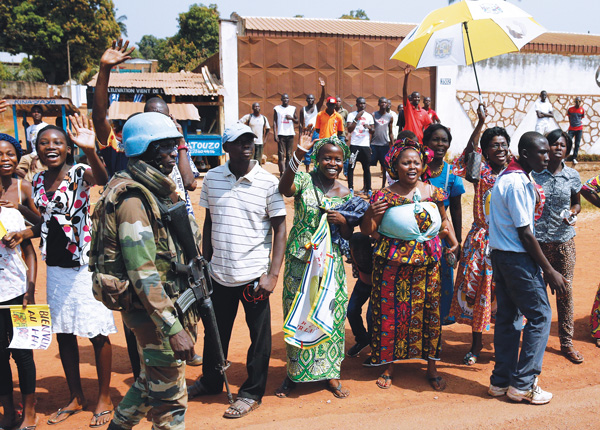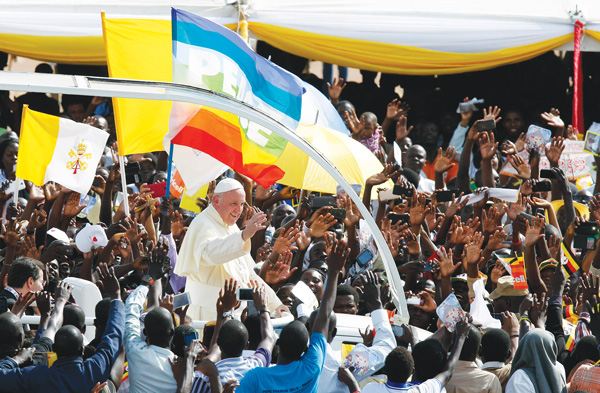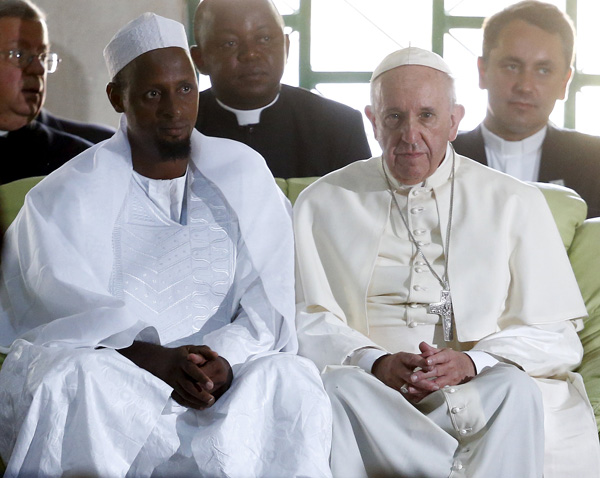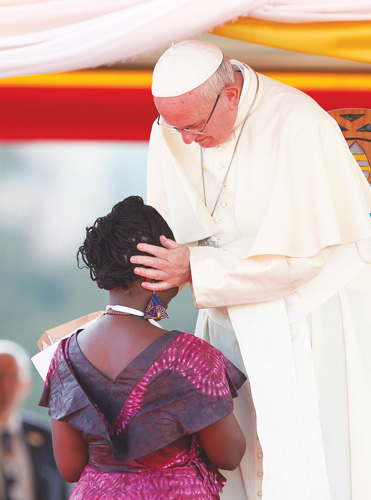By Christopher Lamb
Special to The Tablet

VATICAN CITY – The image of an inverted pyramid where leaders minister to people is how Pope Francis sees the Church. His trip to Africa shows this is how he views the world.
After Kenya and Uganda the pope defied security worries and put his own personal safety at risk in order to travel to the war zone of the Central African Republic (CAR) as an “apostle of hope.”
The themes of the visit are not just limited to Africa particularly as the visit took place as both world leaders gathered in Paris to hammer out an agreement on how to save the planet and the Church anticipates the Jubilee Year of Mercy.
Peace and Reconciliation
Pope Francis chose CAR to launch the Jubilee Year by opening the Holy Door of Bangui Cathedral. He did so in a country that the world has largely forgotten about. On the dust tracks of the capital Bangui there are killings virtually every day by Christian and Muslim militia groups – these barely go reported as there are just a smattering of journalists in CAR.

Hundreds of thousands of people have become refugees in their own country with many living by the airport tarmac that the pope’s plane touched down on. There is only one properly functioning hotel in Bangui, which is the abode of United Nations personnel, diamond traders and to the journalists who were covering the pope’s visit.
Opening the holy door in this setting shows the pope wants mercy to take root in concrete ways rather than exist in the realm of ideas.
During his homily at Bangui Cathedral, he called on people in the country to “forgive their enemies” to work for peace and have faith in the future. And if the pope thinks the Year of Mercy can help solve the problems of a war zone, it is worth watching out for what he does with the final document of the synod on the family, due out during the year. Many are expecting some dramatic moves regarding communion for the divorced and remarried.
Peace and reconciliation was the overarching theme of this trip. In Kenya, the pope called on young people to bring an end to tribalism and in-fighting. And in Uganda, he met with Salvator Kiir, the president of South Sudan, a country that achieved independence just four years ago and is in the midst of its own bloody internal conflict.
Visiting the Muslim Community
A large numbers of the displaced people in Bangui are Muslims. Pope Francis visited a mosque in the center of the city, paid an impromptu visit to a refugee camp and allowed the local imam to ride on his popemobile – Christian and Islamic leaders work closely together in CAR.

Talking to journalists on the plane back to Rome the pope said it was not possible to banish a whole religion because of some groups of fundamentalists. He pointed out that Christians had started wars and had things to apologize for. “The sack of Rome was not done by Muslims,” he quipped.
At a mosque in Bangui, Pope Francis said the fighting in CAR was not primarily about religion and in Kenya, where there have been a number of terrorist incidents by Islamic militants, he said that dialogue with Catholics and Muslims was no longer an optional extra. On the plane, he pointed out that fundamentalism cannot be religious because God is not present.
In the light of the Paris terror attacks his trip to CAR showed the need for dialogue with Islam and a distinction between religious faith and extremism.
Climate Change and Poverty
At the U.N. in Nairobi, the pope said it would be catastrophic if leaders gathering for talks in Paris on climate change could not hammer out an agreement. Throughout the visit, Pope Francis linked protecting the natural world to building a more fair world.
On the plane, the pope said he was happy to visit Africa as it had been a “martyr to exploitation” in a reference to the plundering of its rich natural resources over the years that continues today.
Many experts see the conflict in CAR as more to do with battles over oil, uranium and diamonds.
He also delivered a powerful message to the Paris talks taking place this week. “It is now or never,” he said, adding that the world was a the point of “suicide.”
As is his style, Pope Francis delivered this message from the margins –from a continent that knows the effects of exploitation of its natural habitat. This in turn leads to exclusion and poverty. In Kenya, Pope Francis went to Kangemi, a slum in Nairobi, where more than half of the population lives in informal settlements.

And it was through the lens of poverty that he answered a question on the flight back to Rome about whether the Church should change its position on banning condoms in order to prevent the spread of AIDS. He said the way of framing the question was “too small” and “partisan” – instead, Pope Francis said, the more important question is saving peoples who are dying of malnourishment, lack of water and the trafficking of arms. He used the example of the Gospel story of Jesus being criticized for healing on the Sabbath. While some might apply the story to mean that the Church should relax its ban on condoms to save people, the pope interpreted the story to say it showed those suffering must be helped first, then there can be a debate about use of condoms. It was perhaps a rather Jesuitical answer to a tough question.
Corruption and Governance
In Kenya, he called for an end to corruption and in Uganda he used the examples of the country’s martyrs to inspire more transparent governance. Both countries have high levels of corruption according to non-governmental organization Transparency International.
In Uganda, President Yoweri Museveni, who has been in power since 1986, is planning on standing for election once again next February. In 2005 he passed a law that removed fixed parliamentary terms.
Speaking to young people in Nairobi, Pope Francis said corruption is in all areas of life “including the Vatican” describing it as like “sugar.” The problem, he explained, is that this sugar can turn people “diabetic” and it destroys hearts and countries.
In CAR, Pope Francis called for “unity, dignity and work” and for the country to build its infrastructure. At a mosque in central Bangui he stressed the killings by Christian and Muslim militias were not grounded in religious motives. His message was that the problems in the country can be solved if state institutions start functioning properly.
The Africa visit brought a new chapter to Pope Francis’ papacy for the poor and marginalized. He delivered a global message of hope, reconciliation and peace from a continent that struggles to make its voice heard and a country that most had given up on.






